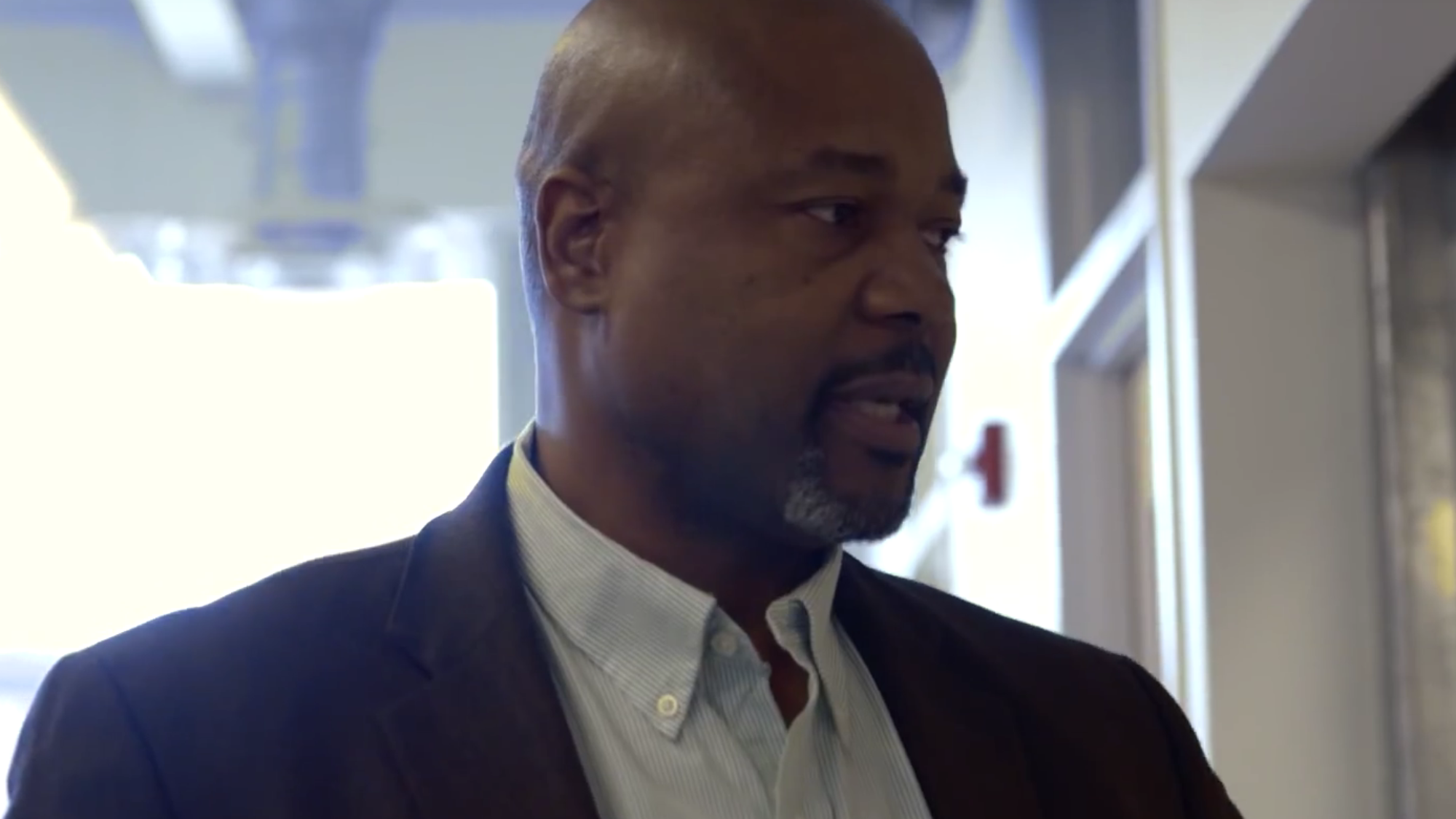
Title: Georgetown Recognizes Bread for the City Leader in Fight Against Poverty
George Jones, chief executive officer of Bread for the City and longtime advocate for the fight against poverty in Washington, DC, will be honored as Georgetown’s 2015 John Thompson Jr. Legacy of a Dream Award recipient early next year.
For nearly 20 years, Jones has led Bread for the City in its mission to serve vulnerable city residents with comprehensive services that include food, clothing, medical care and legal and social services.
“The fact is that people are hungry or at risk of sleeping on the street here in DC,” Jones says. “Oftentimes, it’s difficult for them to find justice in many of the situations they find themselves in. So our lawyers and our food pantry and our medical practice are where we can provide direct physical care. Those services are here to deal with the harsh realities of living in poverty in DC.”
Jones’ work impacts a city where approximately 19 percent live below the poverty line. According to the U.S. Census Bureau, the unemployment rate rises above the national average and, says a report released this month by the Feed America network of food banks, 28 percent of children live with little access to nutritional food.
A Day of Celebration
Jones will receive the award Jan.19 during the university’s annual Martin Luther King Day celebration, presented in partnership with the Kennedy Center for the Performing Arts. The musical celebration will feature the legendary Grammy Award-winning vocalist Natalie Cole.
“George Jones’ steadfast commitment deeply impacts thousands of DC families every year,” says Georgetown President John J. DeGioia. “We are grateful for this opportunity to honor him – and his remarkable work through Bread for the City – with this award.”
Each year, Georgetown recognizes an emerging leader working to solve key issues in the city with its John Thompson Jr. Legacy of a Dream Award, named for the university’s legendary men’s basketball coach emeritus.
“I see this as an award that is about the amazing work that Bread for the City does and the collective that has grown over the years into a real movement of sorts against poverty,” says Jones. “Just as I am honored to be a recipient of this award, I’m also proud to be a member of this organization.”
The Partnership
An intensive yearlong partnership between Georgetown and Jones’ Bread for the City begins after the award presentation in January.
Lecester Johnson, executive director for Academy of Hope Public Charter School, received last year’s award for her advocacy and work with adult education and literacy issues.
“The recognition from the award created so many opportunities for us,” says Johnson, who led the academy into charter school status this year. “The award provides an opportunity to bring some high visibility to the important issues in the community.”
She says the partnership also provided valuable resources to Academy of Hope that included executive education courses at Georgetown’s McDonough School of Business, consultation with members of the university’s leadership team and Georgetown serving as the venue for the academy’s last graduation ceremony.
“It is a resource unlike any other,” Johnson says. “It’s a once-in-a-lifetime opportunity for this year’s winner. He will have an array of expertise at his fingertips. Any time I called to ask if we could get help with something, the response was almost immediate.”
Alleviate the Suffering
Under Jones’ leadership Bread for the City has grown from a having a budget of $1.2 million to an $8.4 million operation that includes an expansion of its center in Northwest DC and a new center in the Southeast part of the District.
“Our goal is to help people living in poverty by not only trying to alleviate the suffering that poverty can cause, but also by trying to rectify the conditions that perpetuate poverty,” he says.
Bread for the City’s medical practice treats about 3,000 new patients a year, and last year its legal services helped more than 4,100 people with advice, referrals or full representation.
The organization’s food pantry feeds about 5,000 households a month.
“The social services programs at the Southeast and Northwest locations see thousands of people each month, helping them to engage in the services we offer and also helping them access services in the larger community,” Jones says.
Many people also come to Bread for the City in need of services the organization doesn’t provide – such as affordable housing or substance abuse treatment – so Jones and his staff often serve as a clearinghouse to direct those individuals to other organizations or city government that can help them.
The staff also lobbies for change.
“We are involved in trying to educate public policymakers around the kinds of systematic changes and reforms that could really make life and communities better as far as income and affordable housing are concerned,” Jones says.
Being a voice for the city’s vulnerable population prompted DC Mayor-Elect Muriel Bowser to appoint Jones as a member of her transition committee on health human services and homelessness.
“We see the impact of the ineffective and effective policies every day when it comes to housing, shelter and other services,” Jones says. “We like to lock arms with our consumers to go in and testify about what’s working and what isn’t, about their hopes and dreams and how programs can help them meet those dreams of lifting themselves out of poverty.”
Dignity, Respect, Service
Before entering Bread for the City’s Northwest location at 1525 7th St. N.W., visitors are greeted with the phrase “Dignity, Respect, Service.”
Bread for the City has been serving the Washington, DC community for 40 years. Its mission is to provide clients with dignity and respect while assisting in them in gaining just treatment.
“We live by those words,” Jones says. “If you work with people in poverty, it’s the most important thing to them. The last thing they want when they come into a place for help is to be treated as less than human. Most people would rather walk away without the service than to be treated in that way.”
Leonard Edwards began his affiliation with Bread for the City as a volunteer in the food pantry in 2002. Over the past 12 years, he has served as a volunteer and donor as well as a client.
“I had my $70,000-a-year job, but life has a way of throwing curveballs at us, and there came a time when I needed help from Bread for the City,” Edwards recalls.
The staff also lobbies for change.
“We are involved in trying to educate public policymakers around the kinds of systematic changes and reforms that could really make life and communities better as far as income and affordable housing are concerned,” Jones says.
Being a voice for the city’s vulnerable population prompted DC Mayor-Elect Muriel Bowser to appoint Jones as a member of her transition committee on health human services and homelessness.
“We see the impact of the ineffective and effective policies every day when it comes to housing, shelter and other services,” Jones says. “We like to lock arms with our consumers to go in and testify about what’s working and what isn’t, about their hopes and dreams and how programs can help them meet those dreams of lifting themselves out of poverty.”
